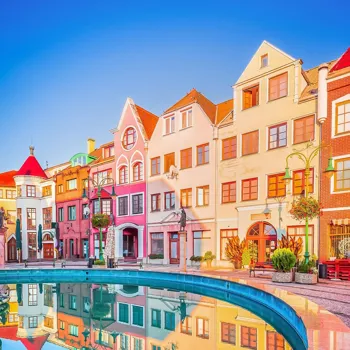Discover the essential tips for your dream European adventure! From when to go to hidden gems, this guide has you covered
Chalo, let's get started on planning your dream trip to Europe! Europe, you see,
is not just one big place, it's a collection of many countries, each with its own flavour and charm.

From the romantic streets of Paris to the historical sites of Rome, and the stunning landscapes of Switzerland, Europe offers something for everyone. But planning a trip can feel a bit overwhelming, isn't it? Don't worry!
This guide will give you all the insider tips and tricks to make your European adventure smooth and memorable.
Choosing the best time to visit Europe is crucial for a memorable trip
First things first, deciding when to go. Europe is lovely throughout the year, but the best time really depends on what you're looking for. Summer (June to August) is peak season. The weather is warm and sunny, perfect for exploring outdoors, but be prepared for crowds and higher prices.
Spring (April to May) and Autumn (September to October) are shoulder seasons. You'll find fewer tourists, pleasant weather, and lower prices. Winter (November to March) can be magical, especially for Christmas markets and winter sports, but some attractions may have limited hours.
Think about what you want to do on your trip, and then choose the season accordingly. For example, if you want to hike in the Alps, summer is your best bet. But if you want to experience the Christmas spirit in Germany, winter is the time to go.
Doing your research and planning ahead is the key to a successful holiday. The earlier you book your flights and accommodations, the better deals you are likely to find.
Europe travel tips: trains scenic, buses cheap, planes fast. Budget, time, preference matter
Now, let's talk about figuring out the whole travel plan. Europe has a fantastic network, with trains, buses, and airplanes connecting all the major cities. Trains are often the most convenient and scenic option, especially for travelling between countries.
Consider getting a Eurail pass if you plan to travel a lot by train. These passes can save you a lot of money, especially if you are travelling within a single region such as Scandinavia, which is a good idea during the winter.
Buses are generally the cheapest option, but they can be slower than trains. Budget airlines offer affordable flights between cities, but be aware of extra fees for baggage and seat selection. When deciding how to get around, consider your budget, time constraints, and personal preferences.
If you're short on time, flying might be the best option. Book in advance, if time permits, and you can save a lot of money by getting different bundles and using discount codes. But remember, trains and buses offer a more immersive travel experience, allowing you to see more of the countryside.
Also, within cities, most offer amazing public transportation systems that allow you to explore nooks and crannies.
Explore lodging options in Europe: hotels, hostels, Airbnb, guesthouses
Next, let's explore how you can find comfortable lodgings. Europe has a wide range of accommodation options to suit every budget, including hotels, hostels, Airbnb apartments, and guesthouses. Hotels offer convenience and amenities, but they can be expensive.

Hostels are a great option for budget-conscious travellers, and they also offer a chance to meet other people. Airbnb can be a good choice if you want more space and privacy, especially for longer stays. Guesthouses offer a more personal touch and are often run by local families.
When booking your accommodation, consider the location, price, and amenities. Look for places that are close to public transportation and popular attractions and read reviews from other travellers before making a decision.
And one more thing, compare prices on different platforms to get the best deal; these include Booking.com, Expedia or direct to the hotel or hostel as they often have discounts as well. Finally, look into staying in accommodation outside of the city centre since those can save you a lot of money.
Pack smart for Europe with versatile clothes, essentials, and season-appropriate items
Packing smart is essential for any trip, especially to Europe, where you might be moving around a lot. Pack light to avoid baggage fees and make it easier to navigate trains and buses. Choose versatile clothing that can be mixed and matched and bring comfortable shoes for walking.
Don't forget essential items like a universal adapter, a portable charger, and any necessary medications. Also, pack a small first-aid kit with basic supplies like bandages, antiseptic wipes, and pain relievers. Depending on the season, pack appropriate clothing.
If you're travelling in the summer, pack light, breathable clothes, sunscreen, and a hat. If you're travelling in the winter, pack warm layers, a waterproof jacket, and gloves. Bring a reusable water bottle to stay hydrated and save money on bottled water.
Also, put your phone in a waterproof case if you travel to colder sections of the world, such as during the winter. And remember to leave some space in your suitcase for souvenirs.
Avoid tourist traps for budget-friendly, authentic travel experiences
Avoiding tourist traps is a must to make the most out of your travelling experience with a limited budget. Touristy areas often have inflated prices and can be overcrowded. To avoid tourist traps, venture off the beaten path and explore local neighbourhoods.

Look for restaurants and cafes that are popular with locals, and try the local dishes. Visit less-known attractions and museums, which often offer a more authentic experience. Attend local events and festivals to immerse yourself in the culture.
Talk to locals and ask for recommendations; they can often point you to hidden gems that you won't find in guidebooks. Also, watch out for scams and pickpockets, which are common in touristy areas. Be aware of your surroundings and keep your valuables safe.
Don't be afraid to haggle in markets and street stalls, but always be respectful. By avoiding tourist traps and venturing off the beaten path, you'll have a more authentic and rewarding travel experience.
Plan for hidden travel costs to avoid overspending
Keep an eye out for hidden costs. One important thing to plan for are costs that are easily brushed over. While planning your budget, remember additional costs such as visa fees, travel insurance, currency exchange fees, and ATM charges is essential.
Visa fees can vary depending on your nationality and the length of your stay. Travel insurance is a must-have, as it can cover unexpected medical expenses, trip cancellations, and lost luggage.
Currency exchange rates can fluctuate, so it's a good idea to exchange your money before you travel or use a credit card with no foreign transaction fees. ATM charges can add up, so try to withdraw larger amounts of money less often.
Also, be aware of tourist taxes, which are common in many European cities. These taxes are usually charged per night and are not included in the hotel price. Finally, factor in the cost of transportation to and from the airport, which can be expensive if you take a taxi.
By being aware of these hidden costs and planning accordingly, you can avoid any unpleasant surprises and stay within your budget.
AI Generated Content. Glance/InMobi shall have no liability for the content











